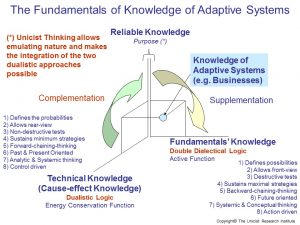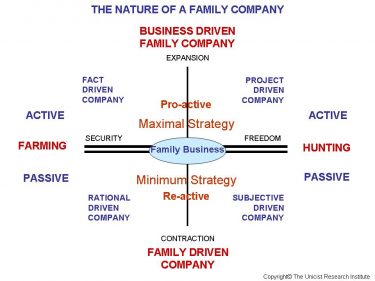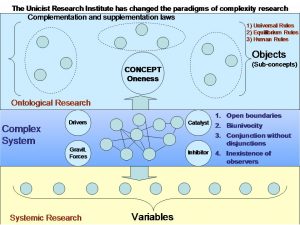Complex problem solving requires having the concept that describes the nature of the solution, the actions that need to be implemented to expand the existing boundaries of the problem and the technical knowledge to develop the minimum strategy to produce results. Concepts can be apprehended when the fundamentals of the solution have been integrated.

Fundamental knowledge without technical knowledge fosters “movement fallacies”. Technical knowledge without fundamental knowledge fosters “inaction fallacies”.
It has to be considered that the intrinsic structures of fundamental knowledge and of technical knowledge are opposite to each other, but their effects are complementary to build a solution.
That is why only people who can deal with the integration of these oppositions can apprehend concepts. This is the case of the universal apparent dichotomy of yin and yang.
The Unicist Theory, based on the discovery of the ontogenetic intelligence of nature, allowed developing the unicist ontological structure of fundamentals, which made fundamental analysis “resurrect from the ashes”.
Fundamental analysis is supposed to deal with the drivers of the nature of any entity but was transformed, probably influenced by technical analysis, into an analytic approach to standardized indicators.
The Unicist Theory provided the framework to research and discover the fundamentals of an entity and defined the structure of their integration.

The symbol of Yin and Yang, representing the TAO, necessarily emulates the structure of the ontogenetic intelligence of nature and is homologous with the Unicist Logic. If you are not aware of the scientific use of the TAO, we recommend reading the book “Tao of Physics” by Fritjof Capra.
Fundamentals are the elements that define the functionality of an entity.
They define the structure of its unicist ontology and allow building its ontogenetic map.
Fundamental analysis is the approach that defines the limits of the possibilities of the evolution of a given reality.
Fundamentals define the boundaries implicit in the functionality of a given reality.
Technical analysis deals with the cause-effect relation between “variables” that have been identified making a systemic compromise.
The discovery of the unicist ontology of evolution and the structure of concepts that regulate the evolution of living beings and their deeds established the structure for fundamental analysis integrating it with technical analysis in order to develop reliable knowledge.

Technical knowledge is popular because it is based on a dualistic logic, which is functional to the use of “binary neurons”. Fundamental knowledge requires accessing a double dialectical logic, which requires an action-reflection-action process. That is why fundamental knowledge is associated with wisdom.
The purpose of a knowledge acquisition process is to obtain reliable knowledge.
Reliable knowledge is necessary when individuals are willing to ensure a minimum strategy or are exposed to uncertain or risky environments.
In every day’s activity only operational knowledge is required.
This ontology is a final synthesis of the use of fundamental and technical analysis in the world of economic, social and business behavior.
Fundamentals describe the ontology of a given reality considered as a unified field. Technical analysis describes the cause-effect relations of a reality considered as a systemic object.
When working in a known context there is only need for feedback (operational analysis), an analytic approach and intuitive / rational decision making.

Technical Analysis and Fundamental Analysis are intrinsically opposite approaches for knowledge acquisition, but they are operational complements when reliable knowledge needs to be acquired. The natural pathway to knowledge acquisition begins by accessing the fundamentals, that define “what” is being done, and continues with the technical knowledge that defines “how” the operational solution will be achieved.
Technical analysis provides sufficient information and the necessary cause-effect groundings to make decisions.
When the context is uncertain the understanding of fundamentals is necessary.
Fundamentals are defined by the concepts that regulate the evolution of a fact.
Validation processes naturally degrade into fallacies when they do not include falsification processes.
Validation implies a non-destructive test and falsification is a destructive test measuring the accuracy and limits of a knowledge.
When a reliable knowledge is required to deal with minimum strategies, risks or uncertainty, the integration of technical and fundamental analysis is required.
The Business Intelligence Strategy
The driver of knowledge acquisition is the need for groundings in order to achieve a reliable knowledge to make decisions. Groundings are necessary when dealing with complexity, risk or uncertainty.
The minimum strategy is given by technical analysis to provide the necessary cause-effect knowledge. The maximal strategy to influence the environment is given by the knowledge of the fundamentals.
The catalyst to accelerate the building of reliable knowledge with a minimum strategy is conceptual knowledge. Conceptual knowledge establishes the secure limits of cause-effect knowledge.
Fundamental analysis and technical analysis provide the operational structure to achieve the objective of having reliable knowledge to make decisions.
When technical analysis is not integrated with fundamental analysis it naturally derives into analogical/hypothetical knowledge. When reliable knowledge is needed both approaches must be integrated.
Synthesis
Fundamental Analysis
Fundamental analysis is the approach that defines the limits of the possibilities of the evolution of a given reality. Fundamentals define the boundaries implicit in the functionality of that given reality.
Although adaptive systems and complex systems have open boundaries, they can only be managed when limits have been defined.
Defining limits based on the fundamentals of a given reality implies dealing with its nature and accepting its evolution laws. In the short or the long run the evolution of a given reality will drive towards its nature.
Fundamental analysis provides the tools to describe the nature of a reality in order to forecast its evolution. Evolution can be inhibited and catalyzed by human actions; but it cannot be changed.
Technical Analysis
Technical analysis deals with the cause-effect relation between “variables” that have been identified by making a systemic compromise.
In order to be able to manage a reality in everyday actions it is necessary to define it with systemic tools.
Systemic tools are based on cause-effect relations and therefore the result of transforming a complex reality into a simple system downgrades the possibilities of success. In technical analysis success becomes probabilistic.
Fundamental analysis defines the possibilities (0 or 1) and technical analysis defines the probabilities (from 0 to 1).
Fundamental analysis has been downgraded during the last 30 years. As there were no objective tools to approach it, it was considered as the “subjective” aspects of technical analysis.
The discovery of the unicist ontology of evolution and the structure of the concept that regulate the evolution of living beings and their deeds, established the structure for fundamental analysis integrating it with technical analysis in order to develop reliable knowledge.
Peter Belohlavek
NOTE: The Unicist Research Institute was the pioneer in using the unicist logical approach in complexity science research and became a private global decentralized leading research organization in the field of human adaptive systems. It has an academic arm and a business arm.
https://www.unicist-school.org/complexity-sciences/wp-content/uploads/2015/03/turi.pdf
 Paradoxically, this process is developed naturally, using intuition, by children, but adults need to recover their capacity of facing reality without fears if they want to develop an action-reflection-action learning process.
Paradoxically, this process is developed naturally, using intuition, by children, but adults need to recover their capacity of facing reality without fears if they want to develop an action-reflection-action learning process.













